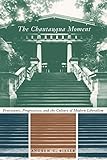The Chautauqua Moment : Protestants, Progressives, and the Culture of Modern Liberalism, 1874-1920 / Andrew Chamberlin Rieser.
Material type: TextSeries: Religion and American CulturePublisher: New York, NY : Columbia University Press, [2003]Copyright date: ©2003Description: 1 online resource (416 p.)Content type:
TextSeries: Religion and American CulturePublisher: New York, NY : Columbia University Press, [2003]Copyright date: ©2003Description: 1 online resource (416 p.)Content type: - 9780231126427
- 9780231501132
- 374.973
- LC6551 .C384 2004
- online - DeGruyter
- Issued also in print.
| Item type | Current library | Call number | URL | Status | Notes | Barcode | |
|---|---|---|---|---|---|---|---|
 eBook
eBook
|
Biblioteca "Angelicum" Pont. Univ. S.Tommaso d'Aquino Nuvola online | online - DeGruyter (Browse shelf(Opens below)) | Online access | Not for loan (Accesso limitato) | Accesso per gli utenti autorizzati / Access for authorized users | (dgr)9780231501132 |
Frontmatter -- Contents -- Acknowledgments -- Introduction: Chautauqua's Liberal Creed -- 1. An American Forum: Methodist Camp Meetings and the Rise of Social Christianity -- 2. The Never-ending Vacation: Boosters, Tourists, and the Fantasyscape of Chautauqua -- 3. Canopy of Culture: Democracy under the Big Tent of Prosperity -- 4. The Liberalism of Whiteness: Webs of Region, Race, and Nationalism in the Chautauqua Movement -- 5. From Parlor to Politics: Chautauqua and the Institutionalization of Middle-Class Womanhood -- 6. Useful Knowledge and Its Critics: The Messiness of Popular Education in the 1890s -- 7. Success through Failure: Chautauqua in the Progressive Era -- Conclusion: Failure Through Success? -- Appendixes -- Abbreviations -- Notes -- Bibliography -- Index
restricted access online access with authorization star
http://purl.org/coar/access_right/c_16ec
This book traces the rise and decline of what Theodore Roosevelt once called the "most American thing in America." The Chautauqua movement began in 1874 on the shores of Chautauqua Lake in western New York. More than a college or a summer resort or a religious assembly, it was a composite of all of these-completely derivative yet brilliantly innovative. For five decades, Chautauqua dominated adult education and reached millions with its summer assemblies, reading clubs, and traveling circuits.Scholars have long struggled to make sense of Chautauqua's pervasive yet disorganized presence in American life. In this critical study, Andrew Rieser weaves the threads of Chautauqua into a single story and places it at the vital center of fin de siècle cultural and political history. Famous for its commitment to democracy, women's rights, and social justice, Chautauqua was nonetheless blind to issues of class and race. How could something that trumpeted democracy be so undemocratic in practice? The answer, Rieser argues, lies in the historical experience of the white, Protestant middle classes, who struggled to reconcile their parochial interests with radically new ideas about social progress and the state. The Chautauqua Moment brings color to a colorless demographic and spins a fascinating tale of modern liberalism's ambivalent but enduring cultural legacy.
Issued also in print.
Mode of access: Internet via World Wide Web.
In English.
Description based on online resource; title from PDF title page (publisher's Web site, viewed 02. Mrz 2022)


